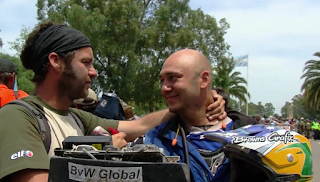 I've been watching the Dakar Rally with great interest once again. It's always a wicked competition that has more in common with the Isle of Man TT than it does any other sporting event. From a Hemingway perspective The Dakar is the real deal.
I've been watching the Dakar Rally with great interest once again. It's always a wicked competition that has more in common with the Isle of Man TT than it does any other sporting event. From a Hemingway perspective The Dakar is the real deal.I enjoy the Dakar more for the battle than I do the singularly focused professional factory teams. This year's high profile dropouts have cast light on just how speed focused the rally has become. With rally drivers and MX racers charging across a carefully chosen course with fairly straightforward navigation and off-road dangers minimized, recent Dakars have felt more like day by day sprints for that faster set than a cross country adventure. Ever rising speeds and increased completion rates seem to support this. Thanks to a Marc Coma designed course, this year's rally seems to have come back to Dakar's core philosophies.
 The completion of a Dakar is a mighty achievement in and of itself. Winning a Dakar is a team achievement that depends on a lot of complex pieces coming together perfectly for weeks at a time, but I've felt like the vehicle operators were increasingly specializing in speed over everything else. Just throw yourself at the horizon and let the mechanics sort it out.
The completion of a Dakar is a mighty achievement in and of itself. Winning a Dakar is a team achievement that depends on a lot of complex pieces coming together perfectly for weeks at a time, but I've felt like the vehicle operators were increasingly specializing in speed over everything else. Just throw yourself at the horizon and let the mechanics sort it out. |
| You don't want to be pushing so hard that you're breaking the vehicle and/or yourself and depending on luck to not have that happen. That kind of racer- think might work on a closed course, but the Dakar is something else. You need some pride to keep you going when you'd otherwise surrender. The meek don't inherit The Dakar. |
These complexities had me trying to think through how you approach a Dakar. The speed bunny approach tends to lean heavily on pride, hand-eye coordination and balls-out courage. If the race organizers did anything other than design speed sections that catter to your approach you complain about it. Luck was taken care of by influencing speed focused course designs that take you on prepared trails and less intensive navigational challenges. This year's Dakar is stressing humility and a considered approach to crossing some truly wild stages. You still need the hand-eye coordination, strength and endurance, but you also need to bring along your strategic thinking. Mashing the throttle and flying over the terrain doesn't work when the terrain isn't pre-screened for you. It pays to be more than a racer in the Dakar.
One of my favorite parts of the 2015 Dakar was the blast across the salt flats. Many of the speed bunnies complained bitterly about it because it was hard on the machinery, but this race isn't just about pinning a throttle. The journey is the destination on the Dakar. Too many were only focused on getting to that destination and making the rest incidental. If they want to race short, closed course rallies, go do that, the Dakar is and should be something else, something bigger.
The Dakar Rally continues to evolve into something better and better. I hope it keeps embracing its uniqueness by focusing on the adventure rather than catering to the wishes of a small subsection of hard core racers who can see nothing other than how quickly they can complete a rally stage. Make it hard. Cross the wilds. Make the winners think about something other than pinning the throttle in order to win it.
The Dakar is happening right now (January 2nd to January 14th, 2017). You can watch it on the Dakar website, and Red Bull TV is also doing daily updates. It's also playing on varied TV channels across the world (but not so much in North America). Daily Motion is another excellent online place to follow the event.
Why else follow the Dakar? It's one of the few motor sporting events that goes out of its way to consider its environmental impact. If you like a considered, intelligent adventure, you should be watching this.
Étape 6 - Dakar Heroes - Dakar 2017 by Dakar - Riders like Lyndon Poskitt are why I love The Dakar








































